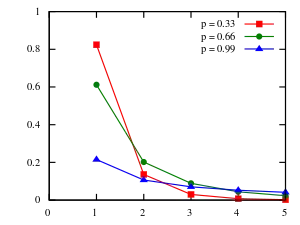Logarithmic distribution
In probability and statistics, the logarithmic distribution (also known as the logarithmic series distribution or the log-series distribution) is a discrete probability distribution derived from the Maclaurin series expansion
|
Probability mass function  Plot of the logarithmic PMF | |||
|
Cumulative distribution function  Plot of the logarithmic CDF | |||
| Parameters | |||
|---|---|---|---|
| Support | |||
| PMF | |||
| CDF | |||
| Mean | |||
| Mode | |||
| Variance | |||
| MGF | |||
| CF | |||
| PGF | |||
From this we obtain the identity
This leads directly to the probability mass function of a Log(p)-distributed random variable:
for k ≥ 1, and where 0 < p < 1. Because of the identity above, the distribution is properly normalized.
The cumulative distribution function is
where B is the incomplete beta function.
A Poisson compounded with Log(p)-distributed random variables has a negative binomial distribution. In other words, if N is a random variable with a Poisson distribution, and Xi, i = 1, 2, 3, ... is an infinite sequence of independent identically distributed random variables each having a Log(p) distribution, then
has a negative binomial distribution. In this way, the negative binomial distribution is seen to be a compound Poisson distribution.
R. A. Fisher described the logarithmic distribution in a paper that used it to model relative species abundance.[1]
See also
- Poisson distribution (also derived from a Maclaurin series)
References
- Fisher, R. A.; Corbet, A. S.; Williams, C. B. (1943). "The Relation Between the Number of Species and the Number of Individuals in a Random Sample of an Animal Population" (PDF). Journal of Animal Ecology. 12 (1): 42–58. doi:10.2307/1411. JSTOR 1411. Archived from the original (PDF) on 2011-07-26.
Further reading
- Johnson, Norman Lloyd; Kemp, Adrienne W; Kotz, Samuel (2005). "Chapter 7: Logarithmic and Lagrangian distributions". Univariate discrete distributions (3 ed.). John Wiley & Sons. ISBN 978-0-471-27246-5.
- Weisstein, Eric W. "Log-Series Distribution". MathWorld.
